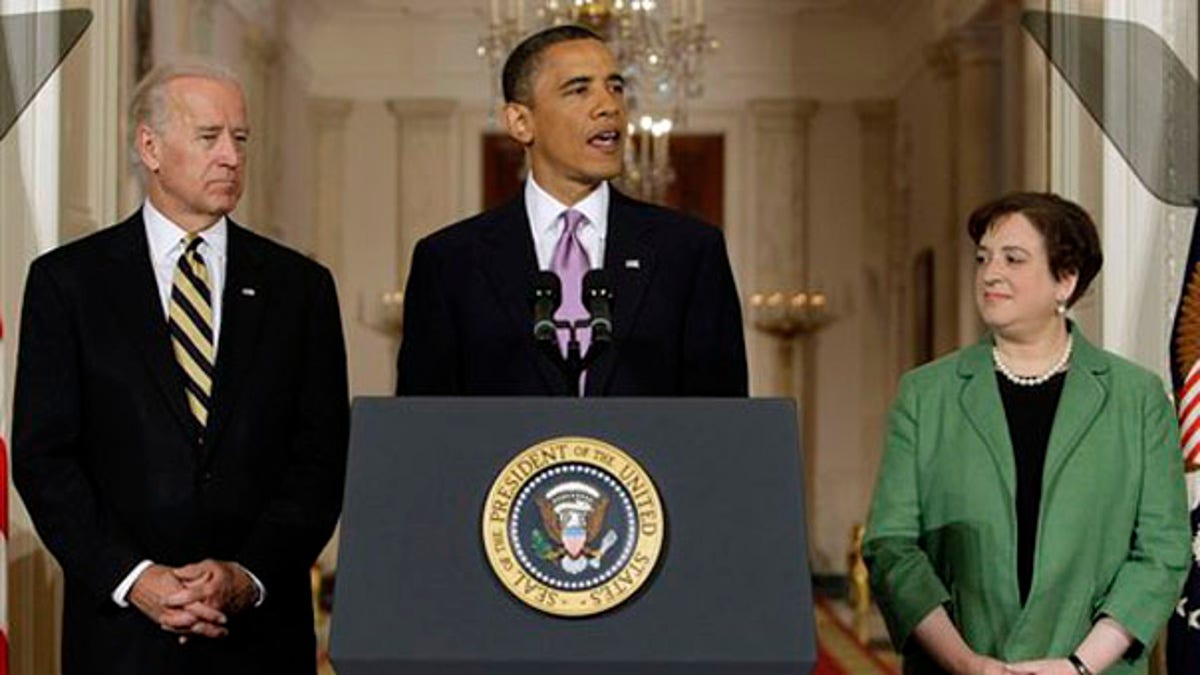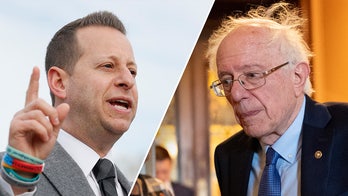
President Obama introduces Solicitor General Elena Kagan as his choice for Supreme Court Justice in the East Room of the White House May 10 as Vice President Joe Biden listens. (AP Photo)
The early debate over Supreme Court nominee Elena Kagan's record is focusing squarely on the controversial decision she made as Harvard Law School's dean to temporarily ban military recruiters from campus over objections to the "don't ask, don't tell" policy.
Kagan was concerned at the time that the military's policy banning gays from serving openly was violating the school's anti-discrimination rules.
Republican senators, aside from questioning the solicitor general's lack of judicial experience, said after President Obama nominated her to the high court Monday that the recruitment stand-off will be front and center during the confirmation process.
"She has taken very few policy positions, and the one policy position that she took in favor of gay rights when she was dean of the Harvard Law School, directly contrary to congressional law ... troubled many," Sen. Jon Kyl, R-Ariz., told Fox News, accusing Kagan of putting her "gay rights agenda above U.S. law."
Sen. Jeff Sessions, R-Ala., ranking Republican on the Senate Judiciary Committee, said the move was a "step too far" and that Kagan would "have to deal with that" in the weeks ahead.
Vice President Biden defended Kagan on ABC's "Good Morning America" on Tuesday, saying she made the right call and showed no discrimination in her decision to side with universities in a brief to the Supreme Court against allowing recruiters on campus.
"All during that period, she has reached out to veterans in the law school, she has been at promotions ceremonies, she's recognized veterans coming to the law school. So this is not a single bit of anti-military bias. She DOES think, and I agree with her, that the don't-ask-don't-tell policy is a very bad policy," he said.
Kagan's battle with recruiters at Harvard took several twists and turns and was not a stand unique to her term as dean. Harvard had banned recruiters from the main recruitment office for more than two decades by time Kagan got there.
After the Solomon Amendment was passed, allowing the federal government to cut off funding to campuses that ban recruiters, the military was allowed to recruit students through the Harvard Law School Veterans Association, a student group.
However, after the Sept. 11, 2001, terror attacks, Republicans in Congress called it a disgrace that military recruiters were being hampered in a time of war, and the Bush administration threatened to cut off funding.
In 2002, Harvard Law School relented and allowed military recruiters to use a campus office. Kagan continued that policy after becoming dean in 2003, the same year a major lawsuit was brought by 36 law schools challenging the Solomon Amendment. Harvard did not join the lawsuit, but filed a brief siding with the other schools. At the time Kagan called "don't ask, don't tell" a "moral injustice of the first order."
She had her chance to act in 2004, after the 3rd U.S. Circuit Court of Appeals found the Solomon Amendment unconstitutional. The next day, Kagan banned military recruiters from using the campus office, though still allowed work through the veterans group.
However, under the threat of another funding cutoff, Harvard relented and Kagan allowed the recruiters to use a campus placement office.
In 2005, the Supreme Court unanimously reversed the 3rd Circuit, finding it constitutional to deny funding to schools that do not allow military recruiting. Afterward, Kagan wrote to the Harvard Law School community to express her displeasure with the ruling.
"I have said before how much I regret making this exception to our anti-discrimination policy. I believe the military's discriminatory employment policy is deeply wrong -- both unwise and unjust. ... I look forward to the time when all our students can pursue any career path they desire, including the path of devoting their professional lives to the defense of their country," she wrote.
The unanimous ruling was a blow to Kagan and has been used to question her judgment.
"It is unfortunate that President Barack Obama has chosen to replace the only military veteran on the Supreme Court with extensive wartime experience with a nominee whose only significant record indicates deliberate hostility and opposition to laws protecting the culture and best interests of the American military," read a statement from Elaine Donnelly, president of the Center for Mlitary Readiness.
Still, some Republicans have indicated they're open to considering her nomination and potentially even voting for her. Seven Republicans voted for her as solicitor general last year -- she is not considered a highly controversial pick, despite the military issue.
"I think she should be given a full chance to explain (the recruitment decision), and she will be given that chance," Sessions said.
The Associated Press contributed to this report.




